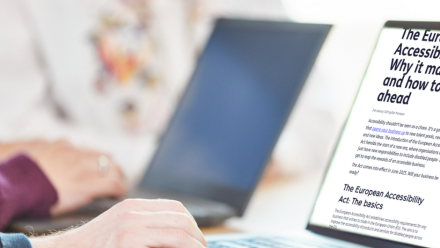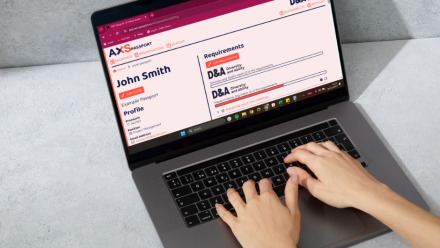How to host events everyone can enjoy
16th December 2024 by April Yeatman and Rachael Roberts

Business events aren’t just networking opportunities; they’re the gateway to fresh ideas, deeper insights, and powerful connections that can drive your career and company forward. An average of 1.3 million business events are held in the UK each year, yet our community is still left behind.
As a disabled-person-led organisation, we love getting out and about, spreading the word, meeting our community and seeing our impact in real-time. Our team has spent years attending events, and we’ve seen the good, the bad and the ugly regarding accessibility. Our online events take place regularly, and in 2022, we hosted our inaugural conference, ‘What inclusion looks like’. We don’t want to keep the good stuff to ourselves!
So here are the six key factors that should be at the top of your mind when planning an inclusive event:
Location, location, location
The number one factor for accessibility is often the physical space itself. At an absolute minimum, there should be a basic standard of accessible physical features such as step-free access, accessible bathrooms, and clear signage. If you’re not sure if a space is inclusive, speak to us (the experts) about physical access audits.
In-person events aren’t your only option! Could your event work remotely as well? If it stays in-person, consider whether everyone needs to be there physically. Hybrid events break down barriers and allow more people to join.
Give attendees a break!
Business events can be exhausting, especially full-day ones. Make your event more inclusive by providing a quiet room and a prayer room for attendees to step away when needed. Clear signage and wayfinding to these spaces allow people to recharge, so they can fully engage with speakers and network comfortably.
It’s all in the details
Comfort is key to fully engaging with a space. Ensure lighting isn’t too harsh and sound systems are accessible, like loop systems for hearing aids, so no one misses vital parts of your event.
Don’t forget seating! No one wants to play musical chairs with their boss for the last seat. Provide enough chairs to avoid awkward scrambles and include space for wheelchair users at tables. Adjustable seating and wide aisles for extra legroom show you’ve thought of everyone’s needs.
Diversify your lineup
Your speaker lineup should be diverse, featuring voices with varied lived experiences to enrich the event’s content and perspectives. Including speakers of different genders, races, ethnicities, disabilities, and backgrounds shows that all viewpoints are valued, making discussions more impactful.
A speaker’s time and expertise are invaluable, so research industry average speaker fees, set a budget and be clear about expectations upfront. Prioritise accessibility for your speakers by accommodating their needs, such as sending questions in advance or offering flexible arrangements. Unsure where to start, we’d recommend using our AXS passport to have structured conversations around accessibility.
Keep sign-up simple
Keep your registration process straightforward and accessible. Forms should be simple, with clear instructions, and available in multiple formats (such as braille, audio, easy read, or plain text). Include a clear contact option so people can ask questions. Even better, beat them to it by creating a Frequently Asked Questions section.
Business events can transform careers, so if possible, offer tiered pricing or subsidised tickets to support those facing financial barriers.
Make communications clear
Picture this: the event of the century. Pigs will fly. Oprah is going to give everyone a car. Everyone has a limo to arrive in. But all the invites are written in Windings. Oops. Oops. .
Your event needs delegates, and delegates need clear and accessible communication. So, prioritise accessible communications right from the start of your event planning. To help ensure your communications are accessible and inclusive, check the guide we wrote for Culture Hive on accessible digital content.
Avoid dietary dilemmas
Free food is always a hit at events! Make it inclusive by offering options like vegan, halal, and gluten-free as standard. Ask about specific dietary needs during registration and provide clear ingredient labels so everyone can make safe, informed choices. Staff who know the ingredients can be a big help too. For detailed advice, check the Food Standards Agency’s guidance on allergens.
Prepare your staff
On event day, ensure your team is ready to support attendees. Brief staff and volunteers on access details like accessible entrances, seating, bathrooms, transport, available assistive tech, and services like sign language interpretation. Training in inclusive practices and disability-inclusive language ensures a welcoming experience for all.
Accessible, inclusive events aren’t just the right thing—they benefit everyone. By welcoming diverse voices, you foster communication and innovation while breaking down barriers that exclude disabled people. Thoughtful planning ensures every attendee feels heard, valued, and included.
Want to ensure that your events represent the gold standard of inclusion? Contact us at welcome@diversityandability.com to discuss training for your staff or review your processes, or book a consultation today!


